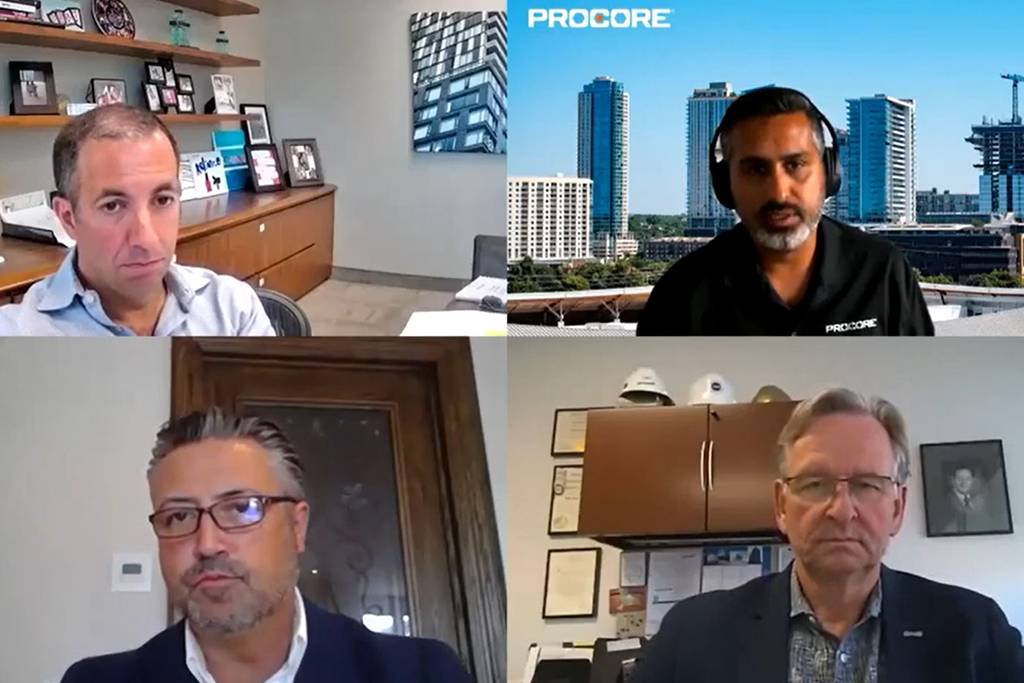Construction experts see a future for the industry that draws resources close but expands to different forms and functions.
A trio of construction leaders drew from their expertise for the Leading Change Through Innovation webinar held Aug. 18 and moderated by Procore Canada vice-president Jas Saraw.
Multiplex Canada president and managing director Terry Olynyk, Reliance Construction Group principal Bryan Kaplan and Bockstael Construction president and past Canadian Construction Association (CCA) chair John Bockstael all pointed to lessons learned from the initial rush to lockdown at the beginning of the COVID-19 pandemic and the way forward for both their firms and the industry.
“It was a whirlwind tour of being unprepared for COVID-19 to being really prepared. We had to adapt quickly to be fully functional, not only for our clients but for our staff and people,” Kaplan said.
“But we’re set up for the next shutdown, which we believe will happen whether it’s a small shutdown in our office or a larger government-mandated one.”
Olynyk said when the order in Canada to go into lockdown happened in March he was en route to Australia, which turned out to be an advantage as he was able to observe their early response to the pandemic and then adapt what he’d observed to his company’s response once he arrived back in Canada.
“We had to take quick action to create a response plan but also make sure our sites were safe. People had to have proper cleaning gear, that almost looked like Ghostbuster packs, but that led to real confidence that our sites were safe,” he said.
Bockstael said his grandfather founded the family business and faced the Spanish Flu, two world wars and the Great Depression, so he was of the opinion the company was quite resilient.
“But that faded quickly when faced with this new pandemic environment,” he said.
Bockstael and other CCA leaders had to cancel the association’s annual conference in San Diego in response to the pandemic. That’s when his opinion of the severity of the situation quickly shifted.
“I was one of the folks who wanted to keep going. I didn’t think it was as big a threat as it was, but boy are my eyes open now,” he said.
“We’ve got to remain humble in the face of this thing and think of where we go next.”
The future of the industry, all three panellists agreed, will centre around being prepared for further shutdowns in every area of the business.
“We’re getting material and putting it in storage because we’re worried the factory producing it might shut down,” Kaplan said.
Bockstael agreed on the importance of Canada becoming self-sufficient in the face of future pandemics.
“We need to find ways to repatriate some of our industries,” he said.
Olynyk pointed to a local supply of material as not only prudent but good for sustainability.
“It’s really important to watch the embodied carbon (in materials) and also buy Canadian,” Olynyk said.
Bockstael also noted the trend towards better sanitation onsite will become permanent.
“One of the adaptations we took on right away were employee health, safety and cleanliness. We installed self-contained hand washing stations mass produced by a client providing hot and cold running water on jobsites. That is irreversible now and it should be mandatory on any jobsite going forward,” he said.
Olynyk said his firm is trying to go digital first and predicted construction as traditionally practiced is “on its way out. We’re on our way to an industrialized model.”
“We build the project digitally and let that cascade through all the elements of construction. It allows us to buy modular with confidence,” he said.
Kaplan said COVID-19 has changed not only how companies build but what projects are being built.
“We’re seeing many Amazon-type projects, with distribution and data centres geared towards the consumer,” he said.
“There will be a morphing to other types of construction,” Bockstael agreed. “How do we modify the vertical rise of office towers to enhance social distancing? We’ll drop the number of employees (in the office) but an increase in the size of workstations might mean no change in overall square footage.”
Bockstael also said demographic changes brought on by the pandemic will affect what forms of residential homes are built.
“What changes we have seen are with immigration, which has plummeted in Canada. The current push on multi-family homes will probably be curtailed or see a dip in the coming months,” he said.











Recent Comments